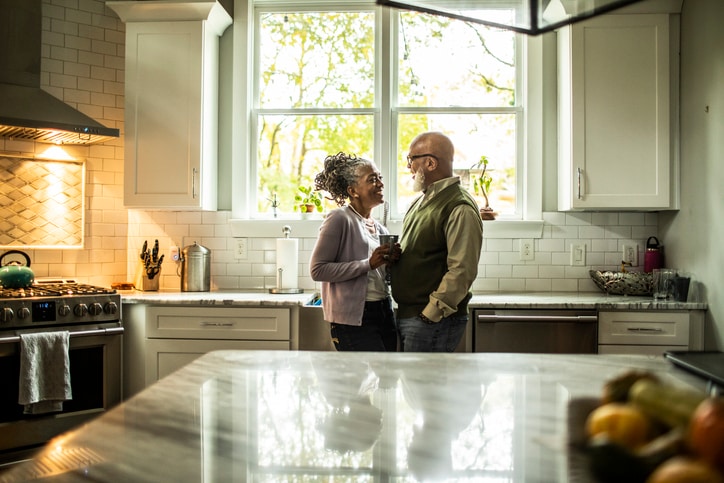As your loved one ages and needs more help than you can provide, it can be challenging and emotional to determine whether to hire in-home help or move them to a facility. Two common options for seniors with significant care needs are nursing homes and professional home care, both of which offer compelling benefits and noteworthy drawbacks.
Home care is flexible and tailored to your loved one’s needs, and the senior remains in a familiar setting. But medical support is limited, and homes may pose mobility and safety issues.
Nursing homes are long-term residential facilities staffed 24/7 by skilled nurses and aides. They’re geared toward those who require a higher level of care than assisted living, but not severe enough for hospitalization. More services are included than with home care, though it’s in a less-personal group setting.
Cost can vary depending on medical coverage and needs, but much of the decision also comes down to your loved one’s comfort, mobility and medical issues. “It’s easy to get overwhelmed with the amount of care options, but it is important to do your research on care providers in your area and what they treat best,” says Susan Benoit, president of CenterWell Home Health, a national home health care provider.
Here’s a closer look at the pros and cons of home care and nursing homes as well as how to determine what’s best for your aging loved one.
“It’s easy to get overwhelmed with the amount of care options, but it is important to do your research on care providers in your area and what they treat best.”
— SUSAN BENOIT, PRESIDENT OF CENTERWELL HOME HEALTH
Pros and cons of hiring home care for your older loved one
Home care can be obtained by hiring an individual caregiver, though it’s often done via an agency that vets and trains employees. Specialities and the level of medical training can vary significantly by agency. For example, Benoit says, “Many agencies only offer in-home care for patients needing rehabilitation from injuries, and some offer post-acute care.”
This option is flexible since you can hire someone for only certain hours or days, which is ideal for tight budgets and if your loved one doesn’t need 24/7 care. While home care is an option to keep a senior aging in place, there’s also the option to move the senior to a relative’s house and have home care provided there.
Pros of hiring home care
Your senior loved one can age in place.
Home caregivers come to the senior, allowing them to remain in the comfort of familiar surroundings.
“Some clients will struggle immensely with the emotional and physical aspects related to a move,” says Kelly Smith, a registered nurse and the administrator and owner of Nestcare, a private home health agency. She adds that moving is especially challenging for memory care or dementia patients, which can lead to injury or elopement (unsafe wandering). Benoit adds that remaining at home can provide seniors a sense of independence, reduce anxiety and even improve recovery outcomes compared to institutional surroundings.
They’ll receive personalized care.
Home care provides one-on-one support, not subject to staffing ratios like at a facility, Smith says. “While it can be more expensive, with home care you can tailor the care hours for those that are specific to your loved one,” she explains. “Perhaps they need more care in the morning to get them started for the day, and then need fewer hours of support in the evening.” You may also be able to find a caregiver willing to help with specific needs, such as transportation or preparing meals.
Cons of hiring home care
You’ll rely on one person or agency.
“Caregivers at home 24/7 are expensive and time-consuming to manage,” says KJ Page, the licensed nursing home administrator of Chaparral House in Berkeley, California.
Page, who has worked in the nursing home industry since the late ‘80s, touts the reliability of facilities — particularly since families using home care may find themselves in a bind if a caregiver calls in sick or needs time off. To avoid this issue, Smith recommends those seeking home care find out if the agency offers on-call staff or coverage if the caregiver is unable to work.
Your loved one will be more isolated.
“Socialization and stimulation are key to keep a senior engaged in life,” says Page. Being home-based leaves seniors with fewer ways to meet these needs.
They may struggle with mobility issues.
Some homes may not be the right environment for a senior’s care, Smith says, especially if stairs become unsafe to navigate or structures like doorways need to be widened to accommodate wheelchairs (which isn’t cheap). She adds that seniors remaining at home will also need to either continue home maintenance or find someone to help.
Pros and cons of nursing home care for your older loved one
Nursing homes are residential facilities where seniors live and have 24/7 access to assistance with medical needs and daily tasks such as bathing, eating, getting in and out of bed.
Home care can be sufficient for chronic illnesses, but patients with severe illnesses or those that need supervision by a medical provider would be best suited for a facility setting like a nursing home, says Benoit.
Pros of nursing home care
Your senior loved one will enjoy more engagement.
Depending on the facility, your loved one might enjoy group meals, movie nights and other entertainment they won’t get at home. “Nursing homes offer a community atmosphere among residents,” says Aaron Blight, founder of caregiving consultancy Caregiving Kinetics and author of ”When Caregiving Calls: Guidance as You Care for a Parent, Spouse, or Aging Relative.” “If your loved one is in need of increased social interaction, a facility may help.”
Nursing homes are built with safety and mobility in mind.
So residents won’t have to worry about fall hazards or spending money to renovate their home to improve accessibility.
Nursing homes are better equipped to manage major medical needs.
Some medical needs and daily support can be met through home care, Blight says. But if there are ongoing medical needs, or risks of acute medical attention, a nursing home could be a better fit due to 24/7 monitoring. It may also be time for a nursing home if the senior is experiencing late-stage dementia and the home environment is no longer safe or secure enough.
Your senior loved one will have access to included services.
Because the senior lives at the nursing home, more services are included in the cost than when living at home. This varies by facility but could include utilities, meals, laundry, medication disbursement, social activities and physical therapy. Some nursing homes offer additional medical services and therapies for an extra cost.
Cons of nursing home care
Your loved one might receive less individualized care.
At a nursing home, seniors have access to help 24/7, says Smith. “However, this care will be provided in a group setting, so it is important to research the staffing and nurse ratios at each individual facility,” she explains.
Blight adds that the per-shift ratio of aides to clients in nursing homes can range widely, anywhere from 1:6 to 1:20, compared to 1:1 with home care.
They’ll be subject to facility rules.
Long-term care facilities often have strict policies and procedures, notes Smith, which can reduce a family’s say in care decisions and result in less direct communication with caregivers.
You might end up paying more than you need to.
Nursing homes are a better deal for seniors who need 24/7 care, Blight says, since paying for an individual professional for round-the-clock care at home is hugely expensive. However, if the senior is somewhat self-sufficient or has only modest medical or mobility needs, they may only need help a few hours a day or certain days a week. In this case, a nursing home could be much more expensive than having part-time, in-home help, says Blight.
“When someone is too ill, too weak, too confused, too unsafe — like falling or leaving and getting lost — it’s time to consider placement in a safer, more supported setting.”
— KJ PAGE, THE LICENSED NURSING HOME ADMINISTRATOR OF CHAPARRAL HOUSE IN BERKELEY, CALIFORNIA
How to decide between home care and nursing home care
As you try to discern the best course of action for your loved one, there are a few other factors to consider:
Your loved one’s health and well-being
For some seniors, chronic conditions or minor medical issues can be handled through home care, but at a certain point, a nursing home is ideal. “When someone is too ill, too weak, too confused, too unsafe — like falling or leaving and getting lost — it’s time to consider placement in a safer, more supported setting,” points out Page. Other potential signs, she adds, include when a senior becomes dependent on others to go to the bathroom or to move in bed to prevent pressure sores.
Their preferences
“It is important to give your loved one as much discretion as possible in care-related decisions,” Blight urges. He notes that as someone’s mental competence diminishes, their family members will become more responsible in decision-making, but it’s key to respect their wishes when possible.
The cost
Find out what might be covered by Medicaid, Medicare, long-term care insurance and any other coverage your senior has. Talk to various providers to see what coverage they accept and compare the out-of-pocket cost for a nursing home vs. home care. Blight points out that the cost of home care is usually calculated hourly, so the total cost is tied directly to how much it’s used.
On the other hand, nursing homes are calculated at a flat rate of per day or per month. “If you need fewer hours of service, in-home care will be substantially cheaper than facility care,” says Blight. “As utilization increases, in-home care rivals and then eventually passes facility care in overall cost.”
The fact that their needs will change
What your loved one needs now may be different months or years later. They might need a nursing home temporarily as they recover from a surgery or rehabilitate from an injury and can transition to home care. Or it can go the other direction: “Sometimes families start off with in-home care, and after a while, a transition to nursing home care becomes necessary because the loved one’s needs have increased,” says Blight.
The answers to key questions
Whether you opt for home care or a nursing home, Smith emphasizes the importance of asking many questions to ensure the caregiver or facility is the right fit. This includes at a high level, such as specializing in the diagnosis or type of care your loved one needs (such as experience with Parkinson’s or Alzheimer’s) and sharing values, she says.
But since states have differing regulations and guidelines, Smith encourages interviewing prospects to ensure you’re in good hands and understand how care would work. For example, she says, if you’re going with a home health agency, find out:
- How they train and supervise their staff.
- If they are providing a licensed certified nursing assistant (CNA) or home health aide (HHA).
- If they do background checks.
- What services are provided (and aren’t).
- What happens if the caregiver is unavailable.
- If the caregiver is trained in infection control practices.
For nursing homes, she suggests similar questions, in addition to inquiring about:
- The facility’s complaint process.
- Staffing ratios.
- Visiting hours and policies.
- Access to care (including physical and occupational therapy).
- Opportunities for socialization.
- Communication with family and so on.
Smith also suggests asking agencies or facilities for references from other clients.
How to make a final decision
If you’re unsure whether home care, nursing homes or even another option is best for your loved one, don’t fret. Benoit suggests contacting the senior’s doctor for advice on what level of care they might need. Another resource at your disposal is hiring an aging life care manager — also called a geriatric care manager — who can guide you to the best option.





